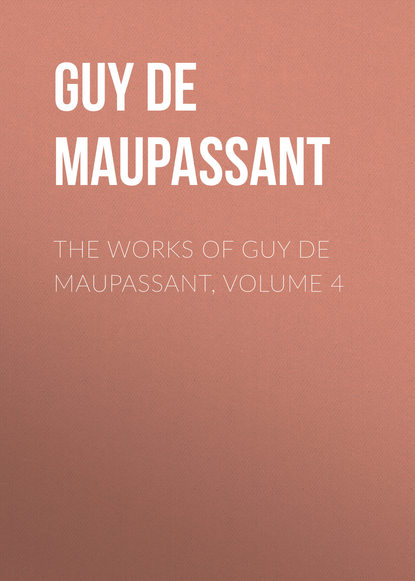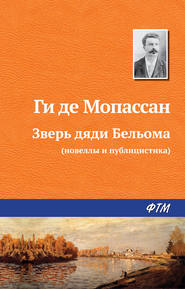По всем вопросам обращайтесь на: info@litportal.ru
(©) 2003-2024.
✖
The Works of Guy de Maupassant, Volume 4
Настройки чтения
Размер шрифта
Высота строк
Поля
He insisted:
"I beg of you, my Bichette."
Then she roughly broke out:
"You know what I said to you. If you are not satisfied the door is open. No one wishes to keep you. As for myself, I have promised; I shall go."
He placed his two elbows upon the table, covered his face with his hands and remained there pondering sorrowfully.
The boat people came down again, bawling as usual. They set off in their vessels for the ball at La Grenonillère.
Madeleine said to Paul:
"If you are not coming, say so, and I will ask one of these gentlemen to take me."
Paul rose:
"Let us go!" murmured he.
And they left.
The night was black, full of stars, overpowered by a burning air, by oppressive breaths of wind, burdened with heat and emanations, with living germs, which, mixed with the breeze, destroyed its freshness. It imparted to the face a heated caress, made one breathe more quickly, gasp a little, so thick and heavy did it seem. The boats started on their way bearing venetian lanterns at the prow. It was not possible to distinguish the craft, but only these little colored lights, swift and dancing up and down like glow-worms in a fit; and voices sounded from all sides in the shade. The young people's skiff glided gently along. Now and then, when a fast boat passed near them, they could, for a moment, see the white back of the rower, lit up by his lantern.
When they turned the elbow of the river, La Grenonillère appeared to them in the distance. The establishment, en fête, was decorated with sconces, with colored garlands draped with clusters of lights. On the Seine some great barges moved about slowly, representing domes, pyramids and elaborate erections in fires of all colors. Illuminated festoons hung right down to the water, and sometimes a red or blue lantern, at the end of an immense invisible fishing-rod, seemed like a great swinging star.
All this illumination spread a light around the café, lit up the great trees on the bank, from top to bottom, the trunks of which stood out in pale gray and the leaves in a milky green upon the deep black of the fields and the heavens. The orchestra, composed of five suburban artists, flung far its public-house ball-music, poor and jerky, which caused Madeleine to sing anew.
She desired to enter at once. Paul desired first to take a turn on the island, but he was obliged to give way. The attendance was more select. The boatmen, always alone, remained with some thinly scattered citizens, and some young men flanked by girls. The director and organizer of this can-can majestic, in a jaded black suit, walked about in every direction, his head laid waste by his old trade of purveyor of public amusements, at a cheap rate.
The large Pauline and her companions were not there; and Paul breathed again.
They danced; couples opposite each other, capered in the most distracted manner, throwing their legs in the air, until they were upon a level with the noses of their partners.
The women, whose thighs were disjointed, skipped amid such a flying upwards of their petticoats that the lower portions of their frames were displayed. They kicked their feet up above their heads with astounding facility, balanced their bodies, wagged their backs and shook their sides, shedding around them a powerful scent of sweating womanhood.
The men were squatted like toads, some making obscene signs; some turned and twisted themselves, grimacing and hideous; some turned like a wheel on their hands, or, perhaps, trying to make themselves funny, sketched the manners of the day with exaggerated gracefulness.
A fat servant-maid and two waiters served refreshments.
This café-boat being only covered with a roof and having no wall whatever, to shut it in, the hare-brained dance was displayed in the face of the peaceful night and of the firmament powdered with stars.
Suddenly, Mount Valerien, yonder opposite, appears illumined, as if a conflagration had been set ablaze behind it. The radiance spreads itself and deepens upon the sky, describing a large luminous circle of wan and white light. Then something or other red appeared, grew greater, shining with a burning red, like that of hot metal upon the anvil. That gradually developed into a round body which seemed to arise from the earth; and the moon, freeing herself from the horizon, rose slowly into space. In proportion as she ascended, the purple tint faded and became yellow, a shining bright yellow, and the satellite appeared to grow smaller in proportion as her distance increased.
Paul watched her for sometime, lost in contemplation, forgetting his mistress, and when he returned to himself the latter had vanished.
He sought for her, but could not find her. He threw his anxious eye over table after table, going to and fro unceasingly, inquiring after her from this one and that one. No one had seen her. He was thus tormented with disquietude, when one of the waiters said to him:
"You are looking for Madame Madeleine, are you not? She has left but a few moments ago, in company with Madame Pauline." And at the same instant, Paul perceived the cabin-boy and the two pretty girls standing at the other end of the café, all three holding each others' waists and lying in wait for him, whispering to one another. He understood, and, like a madman, dashed off into the island.
He first ran towards Chatou, but having reached the plain, retraced his steps. Then he began to search the dense coppices, occasionally roamed about distractedly, halting to listen.
The toads all round about him poured out their metallic and short notes.
Towards Bougival, some unknown bird warbled some song which reached him from the distance.
Over the large lawns the moon shed a soft light, resembling powdered wool; it penetrated the foliage and shone upon the silvered bark of the poplars, and riddled with its brilliant rays the waving tops of the great trees. The entrancing poetry of this summer night had, in spite of himself, entered into Paul, athwart his infatuated anguish, and stirred his heart with a ferocious irony, increasing even to madness, his craving for an ideal tenderness, for passionate outpourings of the bosom of an adored and faithful woman. He was compelled to stop, choked by hurried and rending sobs.
The crisis over, he started anew.
Suddenly, he received what resembled the stab of a poignard. There, behind that bush, some people were kissing. He ran thither; and found an amorous couple whose faces were entwined, united in an endless kiss.
He dared not call, knowing well that she would not respond, and he had also a frightful dread of discovering them all at once.
The flourishes of the quadrilles, with the ear-splitting solos of the cornet, the false shriek of the flute, the shrill squeaking of the violin, irritated his feelings, and exasperated his sufferings. Wild and limping music was floating under the trees, now feeble, now stronger, wafted hither and thither by the breeze.
Suddenly, he said to himself, that possibly she had returned. Yes, she had returned! Why not? He had stupidly lost his head, without cause, carried away by his fears, by the inordinate suspicions which had for some time overwhelmed him.
Seized by one of these singular calms which will sometimes occur in cases of the greatest despair, he returned towards the ball-room.
With a single glance of the eye, he took in the whole room. He made the round of the tables, and abruptly again found himself face to face with the three women. He must have had a doleful and queer expression of countenance, for all three together burst into merriment.
He made off, returned into the island, threw himself across the coppice panting. He listened again, listened a long time, for his ears were singing. At last, however, he believed he heard a little farther off a little, sharp laugh, which he recognized at once; and he advanced very quietly, on his knees, removing the branches from his path, his heart beating so rapidly, that he could no longer breathe.
Two voices murmured some words, the meaning of which he did not understand, and then they were silent.
Next, he was possessed by a frightful longing to fly, to save himself, for ever, from this furious passion which threatened his existence. He was about to return to Chatou and take the train, resolved never to come back again, never again to see her. But her likeness suddenly rushed in upon him, and he mentally pictured that moment in the morning when she would wake in their warm bed, and would press herself coaxingly against him, throwing her arms around his neck, her hair disheveled, and a little entangled on the forehead, her eyes still shut and her lips apart ready to receive the first kiss. The sudden recollection of this morning caress filled him with frantic recollection and the maddest desire.
The couple began to speak again; and he approached, doubled in two. Then a faint cry rose from under the branches quite close to him. He advanced again, always as though in spite of himself, invisibly attracted, without being conscious of anything … and he saw them.
And he stood there astounded and distracted, as though he had there suddenly discovered a corpse, dead and mutilated. Then, in an involuntary flash of thought, he remembered the little fish whose entrails he had felt being torn out… But Madeleine murmured to her companion, in the same tone in which she had often called him by name, and he was seized by such a fit of anguish that he fled with all his might.
He struck against two trees, fell over a root, set off again and suddenly found himself near the river, opposite its rapid branch, which was lit up by the moon. The torrent-like current made great eddies where the light played upon it. The high bank dominated the river like a cliff, leaving a wide obscure zone at its foot where the eddies made themselves heard in the darkness.
On the other bank, the country seats of Croissy ranged themselves and could be plainly seen.
Paul saw all this as though in a dream, he thought of nothing, understood nothing, and all things, even his very existence, appeared vague, far-off, forgotten, done with.
The river was there. Did he know what he was doing? Did he wish to die? He was mad. He turned himself, however, towards the island, towards her, and in the still air of the night, in which the faint and persistent burden of the public house band was borne up and down, he uttered, in a voice frantic with despair, bitter beyond measure, and superhuman, a frightful cry:
"Madeleine."
His heartrending call shot across the great silence of the sky, and sped all around the horizon.
Then, with a tremendous leap, with the bound of a wild animal, he jumped into the river. The water rushed on, closed over him, and from the place where he had disappeared a series of great circles started, enlarging their brilliant undulations, until they finally reached the other bank. The two women had heard the noise of the plunge. Madeleine drew herself up and exclaimed:
"It is Paul," a suspicion having arisen in her soul, "he has drowned himself;" and she rushed towards the bank, where Pauline rejoined her.
A clumsy punt, propelled by two men, turned and returned on the spot. One of the men rowed, the other plunged into the water a great pole and appeared to be looking for something. Pauline cried:

















